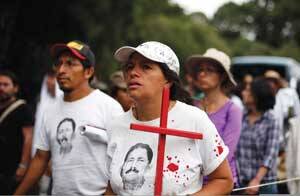Thousands marched through Mexico City on May 8 calling for new public policies in the drug war and the end of violence that has claimed more than 36,000 lives. • The Anglican liturgist Rev. David Holeton said other Christians were “both stunned and dismayed” when the Vatican abandoned the English texts of prayers Catholics had developed with them since the Second Vatican Council. • Cardinal Donald W. Wuerl of Washington, D.C., took symbolic “possession” on May 8 of the Church of St. Peter in Chains, in Rome, home to Michelangelo’s sculpture of Moses. • An Indiana prosecutor dropped charges on May 5 against 94 people arrested for trespassing on the University of Notre Dame’s campus while protesting the invitation in 2009 to President Barack Obama to give that year’s commencement address. • On May 4 the House of Representatives approved a bill that would, among other measures, make the Hyde Amendment permanent, though it is not expected to succeed in the Senate. • The Rev. Mario Rodriguez, National Director of Pontifical Mission Societies in Pakistan, reports tension remains high after the killing of Osama bin Laden, but that churches and schools in Karachi have reopened and pastoral activities have returned to a normal pace.
News Briefs
Show Comments (
)
Comments are automatically closed two weeks after an article's initial publication. See our comments policy for more.
The latest from america
At a Mass for the Jubilee of Youth outside Rome, Pope Leo exhorted over a million young people to be "seeds of hope" and a "sign that a different world is possible."
Perhaps it is the hard-won wisdom that comes with age, but the Catholic rituals and practices I once scorned are the same rituals and practices that now usher me into God's presence, time and time again.
"Only through patient and inclusive dialogue" can "a just and lasting conflict resolution can be achieved" in the long-running conflict between Israelis and Palestinians, said the Holy See's permanent observer to the United Nations.
The ”Bad Guys” films ask, how do we determine who the “bad guys” are? And if you’re marked as “bad” from the start, can you ever make good?








